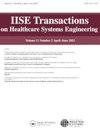管理慢性病护理中的虚拟预约
IF 1.5
Q3 HEALTH CARE SCIENCES & SERVICES
IISE Transactions on Healthcare Systems Engineering
Pub Date : 2020-01-02
DOI:10.1080/24725579.2019.1638849
引用次数: 6
摘要
摘要患者和医疗保健提供者之间的虚拟预约可以为管理慢性病提供传统办公室预约的经济高效的替代方案。虚拟预约通过替代或补充办公室预约来增加与医生的联系,从而改善健康状况。虚拟预约的真正价值只有在与办公室预约系统真正集成后才能实现。在这项研究中,我们引入了一个能力分配模型来研究虚拟预约在慢性病护理环境中的使用。具体来说,我们开发了一个有限时域随机动态程序,以确定哪些患者需要安排办公室和虚拟预约,从而最大限度地提高患者群体的总体健康效益。这个问题的最优策略特征是具有挑战性的。我们发现,在某些条件下,近视启发式是最优的,即将病情最严重的患者安排在办公室预约,将病情次严重的患者计划在虚拟预约。我们表明,即使在更一般的环境中,短视启发式也能很好地执行。我们的研究结果进一步表明,虚拟预约有双重目的:它们可能减少办公室预约的数量,也可能引发后续的办公室预约。本文章由计算机程序翻译,如有差异,请以英文原文为准。
Managing virtual appointments in chronic care
Abstract Virtual appointments between patients and healthcare providers can offer a cost-effective alternative to traditional office appointments for managing chronic conditions. Virtual appointments increase contact with the physician by either substituting or complementing office appointments, leading to improved health outcomes. The true value of virtual appointments cannot be realized until they are truly integrated with the office appointment systems. In this study, we introduce a capacity allocation model to study the use of virtual appointments in a chronic care setting. Specifically, we develop a finite horizon stochastic dynamic program to determine which patients to schedule for office and virtual appointments that maximizes aggregate health benefits across a cohort of patients. Optimal policy characterization for this problem is challenging. We find that, under certain conditions, a myopic heuristic, where the sickest patients are scheduled for office appointments and the next sickest patients are scheduled for virtual appointments, is optimal. We show that the myopic heuristic performs well even in more general settings. Our findings further show that virtual appointments serve a dual purpose: they may reduce the number of office appointments and may trigger follow-up office appointments.
求助全文
通过发布文献求助,成功后即可免费获取论文全文。
去求助
来源期刊

IISE Transactions on Healthcare Systems Engineering
Social Sciences-Safety Research
CiteScore
3.10
自引率
0.00%
发文量
19
期刊介绍:
IISE Transactions on Healthcare Systems Engineering aims to foster the healthcare systems community by publishing high quality papers that have a strong methodological focus and direct applicability to healthcare systems. Published quarterly, the journal supports research that explores: · Healthcare Operations Management · Medical Decision Making · Socio-Technical Systems Analysis related to healthcare · Quality Engineering · Healthcare Informatics · Healthcare Policy We are looking forward to accepting submissions that document the development and use of industrial and systems engineering tools and techniques including: · Healthcare operations research · Healthcare statistics · Healthcare information systems · Healthcare work measurement · Human factors/ergonomics applied to healthcare systems Research that explores the integration of these tools and techniques with those from other engineering and medical disciplines are also featured. We encourage the submission of clinical notes, or practice notes, to show the impact of contributions that will be published. We also encourage authors to collect an impact statement from their clinical partners to show the impact of research in the clinical practices.
 求助内容:
求助内容: 应助结果提醒方式:
应助结果提醒方式:


